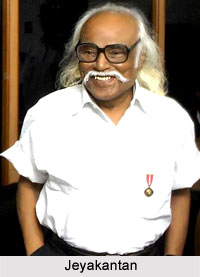 Jeyakantan, also known as Jayakanthan, is a prominent Tamil author, novelist, journalist, critic and filmmaker. Jeyakantan is considered among the most respected writers from Tamil Nadu who have provided great support in the evolution of modern era in Tamil literature. He is mostly popular for his short stories and novels in Tamil language. He has also composed some rare short stories regarding children who die of starvation. These stories are included in the Tevan Varuvana collection. As Jeyakantan is highly idiosyncratic and individualistic, who does not bother about public esteem neither cares for connection and networking with esteemed people, his diction is vigorous as well as influential.
Jeyakantan, also known as Jayakanthan, is a prominent Tamil author, novelist, journalist, critic and filmmaker. Jeyakantan is considered among the most respected writers from Tamil Nadu who have provided great support in the evolution of modern era in Tamil literature. He is mostly popular for his short stories and novels in Tamil language. He has also composed some rare short stories regarding children who die of starvation. These stories are included in the Tevan Varuvana collection. As Jeyakantan is highly idiosyncratic and individualistic, who does not bother about public esteem neither cares for connection and networking with esteemed people, his diction is vigorous as well as influential.
Early Life of Jeyakantan
Jeyakantan was born in the year 1934 in a family of farmers and agronomists in the region of Cuddalore, in the district of South Arcot, in Tamil Nadu. He left school after finishing the 3rd grade. Due to the ruthless behavior of his family at home, at the age of 12, Jeyakantan ran away from his home to Villupuram. He was then raised under the guidance of his uncle from whom he absorbed communist ideologies. There he was introduced to the works of Subramanya Bharathy. Later he started working as a subordinate in the CPI party (Communist Party of India) office. Many of his works includes his various experiences in the office which reveals that he cherished his time spent in there. The CPI office in Chennai was Jeyakantan`s primary school and the members of the communist party became his immediate family. Jeyakantan learned proper Tamil from a pandit.
Later he was compelled by circumstances to move around working is different Jobs. He also worked in the printing press of the party and spent his leisure time by selling the magazine JanaSakthi at the street corners. The lack of scholarship of Jeyakantan in matters of religion is evident from his literary work. The Tamil author started writing in Tamil magazines at a young age. From the year 1953, Jeyakantan wrote for several magazines like Anantha Vikatan, Grama Uzhiyan, Thamarai and Saraswathi. Jeyakantan later turned out to become one of the most creative and influential Tamil writers of the 20th century. He had also contributed to Tamil Cinema and made a film based on his novel Unnaippol Oruvan. It was the first Tamil film to receive an award at the national level in the country. Jeyakantan`s Tamil film received the President`s award in The Best Regional film category.
Literary Works of Jeyakantan
Jeyakantan has written a number of novels and novelettes in Tamil that are considered as gems of modern Tamil literature. Some of his most renowned literary works in this particular genre includes Arputham , Unnaippol Oruvan, Cinemavukkup Pona siththaal , Rishimoolam, Innum Oru Pennin Kadhai , Andha Akkaavaiththedi , Kazhuththil Vizhundha Maalai , Katru VeLiyinile , Idhaya Ranikalum Ispedu Raajakkalum , Illaadhavargal , O America, Isvara Alla Tere Naam , Sundhara Kaandam , Ayudha Poosai , Kaaru , Kaaththirukka Oruththi , Indha Neraththil ival , Appuvukku Appa Sonna Kadhaigal , Paattimaargallum Peththimaargalum , Ovvoru Kooraikkum Kizhe , Oru Manidhanum Sila Erumaimaadugalum , Moongil Kaattunile , Karikkodugal , oorukku Nooru Per , Engengu Kaaninum , Pavam, Ival Oru Paapathi , Oru Kudumbaththil Nadakkirathu , Gangai Engey PogiraaL , Jaya Jaya Sankara, Oru Manidhan Oru Vidu Oru Ulagam , Oru Nadigai Naadagam Paarkkiral , Sila Nerangalil Sila Manithargal , Kokila Enna Seythu Vittaal, Parisukkup Po, Karunaiyinal Alla , Piralayam , Brahma Upadhesam , Yarukkaga Azhuthan , Kaivilangu and Vazhkkai Azhaikkiradhu.
But he is most popular for his creations of various Tamil short stories such as Sattai, Kuraip Piravi, Yanthiram, Irandu Kuzhanthaigal, Pommai, Thuravu, Poo Uthirum, Illathathu Ethu, Naan Irukkiren, Kansimittum Vinmeengal, Sumaithaangi, Pugai Naduvinile, Chakkaram Nirpathillai, Virakti, Iravil, Gurupeedam, Irandha Kaalangal, Suyadharisanam, Pudhiya Vaarppukal, Unmai Sudum, Yugasandhi, Maalai Mayakkam, Dhevan Varuvaara, Inippum Karippum and Oru Pidi Soru.
The Tamil essays entitled Bharathi Paadam and Imayaththukku Appaal are also written by Jeyakantan. Moreover he has also written biographical works of Vazhavaikka Vandha Gandhi (biography of Gandhi) and Oru Kadhasiriyarin Kadhai (biography of Munshi Premchand). His autobiographical include Oar Ilakkiyavaadhiyin Arasiyal Anubavangal and Oru Ilakkiyavaadhiyin Kalaiyulaka Anubavangal.
Awards of Jeyakantan
Jeyakantan has been honoured with various awards for his literary contributions. These are:
* Sahitya Akademi Translation Prize (1972)
* Fellow of Sahitya Akademi (1996)
* Jnanpith Award (2002)
* Padma Bhushan- First time for Tamil Literature (2009)



















